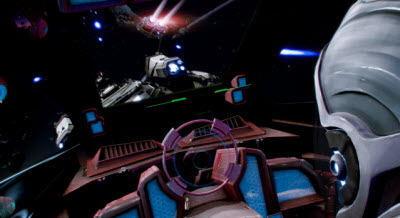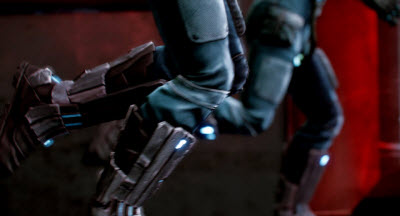GamesBeat: How do you figure out how much money might be enough? I got a look at the THQ documents. They said Saints Row 4 was supposed to rake in $185 million, and they have a margin of $50 million. That means they’re spending $135 million to get that game out, with marketing and everything.
Roberts: Triple-A games are definitely expensive when they’re console. A big publisher’s per-person costs are more expensive than mine down in Austin where I’m running it lean and mean. I’ve got no executive overhead, none of that.
An EA will have, what, $30 million or $40 million for their development? Then they’ll spend at least $20 million for the marketing. If it’s a bigger game they’ll go higher. You add those numbers up and after you back out returns and everything else, it’s about $35 dollars a unit you’re putting away. If I’m already in for $60 million, I have to sell two million units just to get that back. Then I have to manufacture two million discs. That’s another $20 million. I’m behind the eight ball again and losing money. Really I’d need to manufacture three million discs and sell them all to get close to breaking even. That’s the EA break-even generally, from what I remember. Then you want to make a profit. Let’s manufacture four million discs at this point. That’s how those numbers happen.
The beauty of digital is you don’t have those cost-of-goods issues. Nobody’s asking you to manufacture four million discs at $10 dollars a pop up front. You can scale with it. When we finish Star Citizen, we’ll be an expensive game. We won’t be as expensive as a big triple-A console game, but we’ll have about as much value and assets in it. We don’t have the same issues of manufacturing a bunch of physical goods and getting them into the channel. We’re capturing a much larger percentage of the final price. That’s a big issue, if I’m selling a $60-dollar game and only putting $35 dollars in my pocket. In our case, we can sell a $60-dollar game and just give three or four percent to the payment provider. It’s an opportunity for someone like me. I can be in the business without selling four million copies and still do very well.
The money we’ve raised to date is not the end. There’s private equity. We’re continuing to raise money. My expectation is that over the next two years we will probably have raised at least as much as we already have, and maybe more so. There’s going to be opportunities as you go. When we start to do the dogfighting alpha, you can play that. We’ll get more people coming in to pledge for their ship and play.
My experiment is, I would love to have financed the entire game from the players in the crowd, leaving the equity as an insurance policy. We’ve got enough that we don’t need to do that, but I’m interested to see if I can achieve it. Like I said, it’s almost like we’re releasing mini-games along the way. There will be plenty of value. Our player base will get bigger. By the time we launch we’ll hopefully have 200,000 or 300,000 people instead of the 100,000 we have now. If we do that, we’ll definitely have financed the game from that alone. It’s a slightly more big-budget version of Minecraft. [laughs] That would be a good place to be in. He’s doing quite well.
GamesBeat: Did the fans change a lot about what you were planning on doing already?
Roberts: I don’t know if it changed a lot, but it showed what’s useful about having an active community that’s really invested. It’s a great feedback mechanism for figuring out what’s important to people. Whenever you do something big and ambitious, there’s always more things that you can do properly. You have to make a decision on where you’re going to spend your resources. We have a dedicated focus group in our community. There’s not some marketing department recruiting a focus group, either. These are people who love this genre so much and want to play this game so much that they’ve given us money two years before it’s come out. They’re vocal about what’s important to them.
The way we run it, it’s not that we just listen to any one voice on the forums, because that never works. The people who shout the loudest aren’t necessarily the majority. But we get the general feeling of sentiment and we do a lot of polls. We have thousands of people responding. Then you’re more in the realm of statistics. We use that as data points to help decide what areas we’re going to give more TLC and which areas would be lower on the priority list. That’s really efficient and useful for a developer.
A lot of times when you make a game, you build a bunch of stuff, and then when you ship the game you see that no one’s using those features that you spent all this time on. “If I’d known that I’d have spent all the time on this feature over here that everyone loves.” Having a community this early helps you out with that. It helps you learn what’s really important to people, and it helps you with poking holes in systems or ideas that you’ve got now. We talked about the insurance system on the ships. A lot of people were coming up with all these insurance fraud scenarios. It was great. “Okay, cool. Now we can counter that.” You know up front and you can build it into the system instead of having to patch it.
GamesBeat: Now that you also have the money, you may have more options. Would you think about doing a version of this on somebody’s next-gen console? The timing is looking good.
Roberts: [Laughs] The next-gen consoles are basically the high-end PCs of today, so they’ll be capable. It’s more a matter of the thing Gabe talks a lot about. Are you open or closed? One of the reasons why we’re on the PC is because it’s open. We can push a lot content and data out to the user base and update the universe frequently without having to go through all sorts of certifications on a closed system. The way we’re designed right now, it won’t work on a console in that current setup.
There’s a lot of talk out there about that changing. If it does change, we’ll reassess it. We’re not elitist. You don’t have to be part of the PC master race to play Star Citizen. But I’m pragmatic about it. I like the PC. I can push the gameplay experience the farthest on a PC. I can have the coolest hardware. I’m not limited by my frequency of updates or anything like that. That’s why we’re focused on it. But if there’s an opportunity somewhere else and it can be open, then of course we could take a look at it.
GamesBeat: Do you share any of Valve chief exec Gabe Newell’s concerns about the openness of the PC?
Roberts: You mean about Windows 8?
GamesBeat: Yeah. He’s not happy about Steam and Windows 8.
Roberts: I have my Razer laptop that I put Windows 8 on to play around with. I think I may need to be installing whatever that Start8 thing is, that basically makes it like Windows 7. I hate the Metro screen that keeps trying to take over. Underneath it all, though, it’s pretty much Windows 7. They have this whole app thing and the Metro thing on top, but you can do the same desktop apps and everything.
GamesBeat: He talked around it, but his complaint sounded like they were closing it all off, as opposed to living up to the legacy of keeping it open.
Roberts: They’re doing it on the front end. They’re curating it a bit so it’s more like Apple, but you can still go anywhere on the net and download anything. The initial experience for someone who may be more of a neophyte is a bit more directed and curated. As far as I know, Microsoft isn’t forcing you to only have Metro apps on your PC. If they did that, yes, there’s definitely trouble. I think that’s what Gabe is afraid of — not what Windows 8 is today, but the trajectory that he can see it taking, where the next step is, “Metro apps only and they have to go through our store where we’ll charge you X percentage.”


